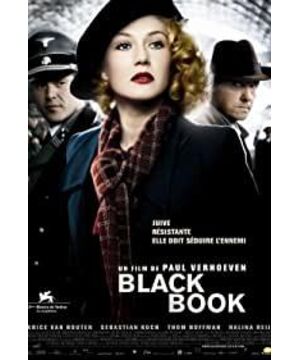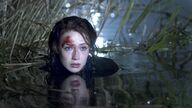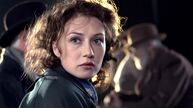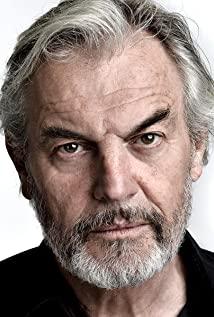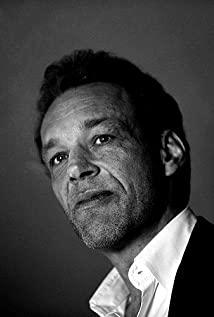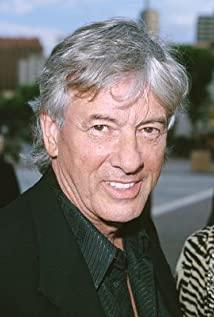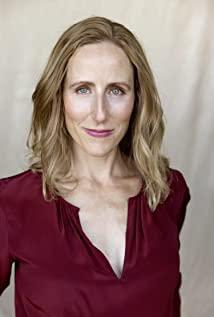This is a story about World War II. The keywords are war, love, humanity and gray. The topic of World War II is too heavy, whether it is looking at history from a macro perspective (such as "Conquering Berlin", "Tiger Tiger Tiger", "The Longest Day"), or looking at reality from the joys and sorrows of small people (such as "A Beautiful Life") , "The Soldiers Are Under the City", "The Pianist"), the final victory of justice over evil cannot dilute the overall atmosphere of tragedy. People can never ignore the deep damage caused by the largest war in human history. -Especially the destruction of the entire human spiritual world-it forces us to continue to reflect, thinking about the origin of war and how the terrifying atrocities born in the process happened. This makes the narrative of World War II movies must be loaded with the important task of moral interrogation and value inquiry. In the "Black Book", this inquiry goes further. The film tells the story of a Jewish woman, Rachel, from fleeing to resistance under Nazi persecution. Because her parents and brothers were brutally killed by the Nazis, the weak woman who was just trying to find a refuge in troubled times resolutely joined the Dutch underground resistance organization, and under the guidance of the organization, broke into the German army and became the mistress of German Captain Munz. But traitors have repeatedly appeared within the organization, making almost all actions fail one by one. Rachel not only exposed his identity, but was also trapped by the insidious Nazis and became a well-known "traitor". But with the help of friends within the Nazis, she and Munz escaped from prison and escaped until the end of the war. But Rachel obsessed with avenging his relatives and washing away his grievances, so after the victory, he and Munz returned to the Netherlands to track down the culprit, conducting a thrilling investigation in the fog. But soon, Munz was unfortunately arrested and killed at the gun of the German, Rachel was also named a traitor and was humiliated in every possible way. At this moment, Hans, the leader of the former resistance organization, appeared. He rescued the helpless Rachel, but what is unimaginable is that this man who is praised as a national hero is the traitor. He killed the Jews including Rachel's parents for money, and also designed to poison almost all members of the resistance organization. The angry Rachel finally eradicated the demon with superhuman courage and courage. At the end of the film, Rachel and the old man who lost his son are sitting on the bank of the river. The struggling of the traitor on the hearse behind him gradually disappears. The camera slowly zooms out, surrounded by silence, and the gray sky seems to envelop everything. . At this time, all the language becomes superfluous, and we seem to hear the protagonist’s heart flowing slowly, like weeping, mixed with sadness and helplessness, and don't know where to go.
This is a story that combines thrills, excitement, and suspense. Many elements of it are not uncommon in Hollywood movies. A Hollywood director can freely use his imagination to create exactly the same as the first half of the film. But the most vulgar and unavoidable thing for them is to create an omnipotent national hero. At the end, the hero and his or her lover must be happily embraced by the fire. In contrast, the second half of Paul Vanhoven is the most exciting and moving part of the "Black Book." From the beginning of Rachel and Munz’s love, the film stretched its tentacles into a gray area: the possibility of reconciliation and even fusion between the enemy and ourselves. But the director was too rough in dealing with this issue, and did not produce a sufficient plot for the audience to confirm the relationship between the two, as if it was only a simple desire that made Monts not kill Rachel, and even went with her. Flee, share weal and woe. Could it be that just because of sex or love (if the director so wishes), can a Nazi with blood on his hands quickly transform into a humanitarian? What’s more surprising is that Muntz discovered that she was a Jew when he had a relationship with Rachel for the first time, but he didn’t mind and got along with her in a muddle, until he found out that she was a member of an underground organization. The matter was brought up again, but the pistol he had raised was immediately knocked aside by Rachel's anger. This can’t help but recall the demon Nazi officer’s fascination with a Jewish girl in Schindler’s List. He clearly knew that she was a Jew and an inferior nation, but he couldn’t restrain his desire to be with her, but In the end, cruel Nazism prevailed and the girl was sent to a concentration camp. In contrast, the love affair in the gray area of "Black Book" has encountered much less personal resistance, and the Nazi color of Munz has also been watered down a lot, which is obviously too idealistic. I am not ashamed to guess whether the director has subconsciously accepted the creed of American cinema’s love supremacy after going abroad for 20 years? The suspicious love affair between Rachel and Monts is the biggest failure in the film, but if they don't fall in love, the plot will be unsustainable. I'm afraid this is also the dilemma facing the director.
The second gray area involved in the film is whether the enemy and our camp are really black and white? After the war, the people who celebrated the victory sang and danced, but at the same time they could not forget to punish the traitors. But punishment is not a just procedure conducted in accordance with the provisions of the law. It can only be reduced to a pure personality insult: cutting their hair, stripping their clothes, and throwing dung on them! This kind of punishment is comparable to the extreme atrocities of the Nazis, and it is the greatest tarnishment of personality and humanity! The director is also full of disgust here to create a group of drunks, soldiers, and prostitutes, let them carry out insults to Rachel. But is this insult only something that vulgar and ignorant people can make? What about ordinary citizens, people who have been traumatized in the war? Don't they also hate cursing traitors in their hearts? If given the opportunity, will ordinary people become cruel? The director deliberately avoided this possibility, focusing only on showing what Rachel had endured, and giving the abuser a disgusting face, narrating this issue from an image rather than a moral point of view. Intuitively, the audience's doubts are avoided. Here, the director deliberately dispelled the gloom of human nature, leaving more space for simple narrative, lacking in-depth exploration and questioning. The rhythm and angle of the narration did not allow him to stay on this issue, and the possibility of in-depth exploration was eliminated.
The most quintessential part of the film is also the part with the strongest degree of gray, which is the moment when the true face of the traitor is revealed. The traitor is not only the moral lawyer, but Hans, the leader of the resistance organization. His greed made him betray the motherland and the people, and personally led his comrades to death. It is this biggest villain who, after obtaining the gold and silver stained with Jewish blood and resentment, also won the cheers and support of the people. This wonderful irony fills in the film's lack of moral interrogation to a certain extent. Hans' front-to-back flip actually expresses the problem that the director has been trying to explain: moral uncertainty. Who is absolute justice and who is extreme evil? Under the big hat of ideology, can the weak voice of the individual form a counter-examination of this issue? Can the Nazis embark on a humanitarian path, either by love or by conscience? Can ordinary people break through the moral bottom line of being human because they hate evil, thus causing de facto crimes? Moreover, those so-called defenders of justice have no personal desires and no possibility of going astray? Paul Van Hoeven wanted to express so much in a short film that he had to ignore many detailed questions. While this kind of narrative rhythm that can't stay for a moment brings shock and pleasure to the audience, it also lacks the persistence for careful scrutiny.
With the continuous internationalization of the film market, films from various countries with strong local flavors are easily branded as literary films, and so-called international films that suit the tastes of the masses must have those things that can quickly attract attention. To cater to the tastes of the public with a low profile, movies that are too deep or too ego are often not recognized. Although Paul van Hoeven has been sharpening his sword for two decades, he seems to be unable to ignore the vast international market. Therefore, the Hollywood narrative elements contained in the "Black Book" have been transformed from gimmicks to ontology. This is indeed a process of being disciplined under the invisible system, and the image that appears behind this is probably not only rich and powerful. , Hollywood film capitalists who are arrogant, have a generation of audience domesticated by Hollywood movies.
View more about Black Book reviews


